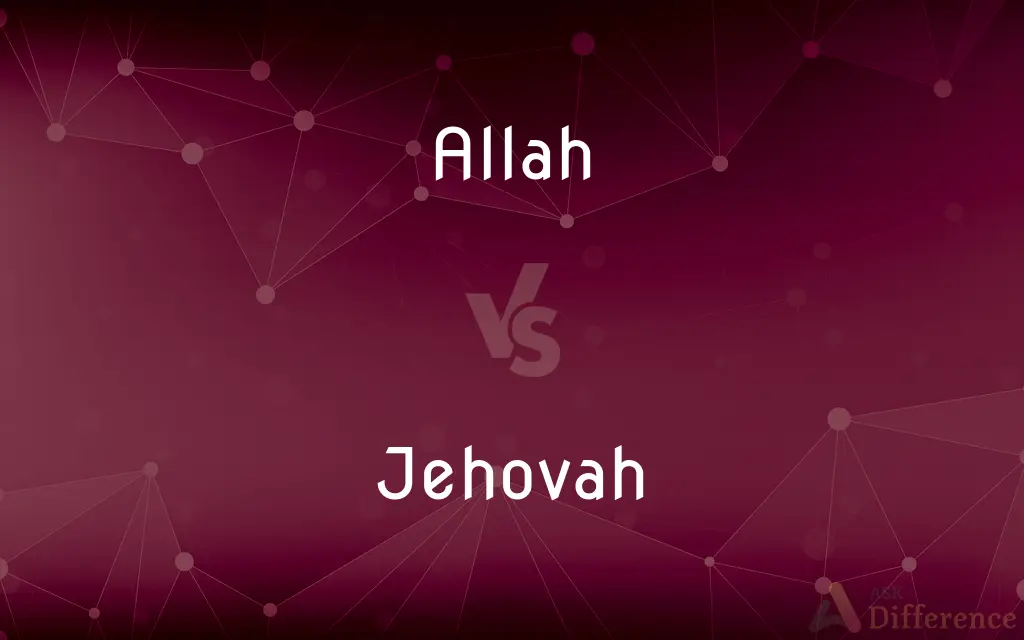Allah vs. Jehovah — What's the Difference?
By Fiza Rafique & Urooj Arif — Updated on March 13, 2024
Allah is the Islamic term for God, emphasizing unity and transcendence, while Jehovah, often used in Christianity, highlights a personal, covenantal relationship with God.

Difference Between Allah and Jehovah
Table of Contents
ADVERTISEMENT
Key Differences
Allah, in Islam, represents the singular, omnipotent, and omniscient deity, emphasizing the oneness and absolute sovereignty of God. This concept is central to the Islamic faith, where Allah is beyond all comprehension and not likened to any of His creation. On the other hand, Jehovah is a name often associated with God in Christianity, derived from the Tetragrammaton YHWH, and conveys a sense of a personal, covenantal God who is in a relationship with His people.
The name Allah is used universally by Muslims regardless of their language, highlighting the universality of Islam's God. It conveys God's transcendence, immanence, and uniqueness in Islamic theology. Whereas Jehovah, primarily used in English translations of the Old Testament, reflects the Judeo-Christian emphasis on a personal God who reveals Himself to and interacts with humanity, especially through the covenants with Abraham, Moses, and the coming of Jesus Christ.
Islamic theology strictly emphasizes Tawhid, the oneness of Allah, negating any form of polytheism or anthropomorphism, and maintaining that Allah is beyond human comprehension. In contrast, the Christian understanding of God, while also monotheistic, includes the concept of the Trinity (Father, Son, Holy Spirit), which presents a complex unity within the Godhead, a concept not found in Islamic theology.
The names and attributes of Allah in Islam are detailed extensively in the Quran and Hadith, outlining His mercy, justice, wisdom, and other qualities. Muslims often recite the 99 Names of Allah, each reflecting different aspects of His nature. Conversely, in Christianity, the various names of God, including Jehovah, reveal His character, actions, and His relationship with His creation, as portrayed in the Bible.
The concept of worship and relationship with God differs significantly; Muslims engage in five daily prayers, among other acts of worship, as direct acts of submission to Allah's will. On the other hand, Christian worship involves prayer, sacraments (such as baptism and communion), and personal relationship with God through Jesus Christ, emphasizing grace and redemption.
ADVERTISEMENT
Comparison Chart
Definition
Islamic term for the one, omnipotent God
Name often used for God in Christianity, emphasizing a personal relationship
Theological Emphasis
Oneness and transcendence of God
Covenantal relationship and personal interaction with humanity
Key Concept
Tawhid (Oneness of God)
Trinity (in most denominations) - complex unity within the Godhead
Attributes
99 Names in Islam highlighting various aspects like mercy and wisdom
Various names in the Bible reflecting character, actions, and relationships
Worship and Relationship
Five daily prayers, submission to Allah's will
Prayer, sacraments, and a personal relationship through Jesus Christ
Compare with Definitions
Allah
The term used in Islam to refer to the one, unique God, emphasizing His sovereignty and oneness.
Muslims around the world turn towards Kaaba when they pray to Allah, symbolizing unity.
Jehovah
The Christian doctrine of one God in three persons: Father, Son, and Holy Spirit.
Christians believe in the Trinity, which includes God the Father, Jesus Christ as the Son, and the Holy Spirit.
Allah
The acts of worship in Islam, including prayers and fasting, as direct submission to Allah.
During Ramadan, Muslims fast from dawn to dusk as an act of worship and submission to Allah.
Jehovah
Central themes in Christianity, emphasizing salvation through faith in Jesus Christ.
Christians believe in Jehovah's grace and redemption offered through the sacrifice of Jesus Christ.
Allah
The holy book in Islam, believed to be the word of Allah as revealed to Prophet Muhammad.
The Quran outlines the guidelines for Muslims to live a life in accordance with Allah's will.
Jehovah
A name used for God in Christianity, derived from the Tetragrammaton YHWH, highlighting His personal nature.
The name Jehovah appears in the Old Testament, emphasizing God's covenant with His people.
Allah
Attributes of Allah in Islam, each reflecting a different aspect of His nature.
Among the 99 Names of Allah, 'Ar-Rahman' (The Most Merciful) and 'Ar-Rahim' (The Most Compassionate) are frequently recited.
Jehovah
The agreements between God and His people, showcasing God's promises and faithfulness.
The covenant with Abraham is a key event where Jehovah promises blessings to His people.
Allah
The Islamic concept of the absolute oneness of Allah, central to Islamic faith.
The concept of Tawhid teaches that Allah is indivisible and unparalleled in Islam.
Jehovah
The holy scripture in Christianity, consisting of the Old and New Testaments.
Christians study the Bible to understand Jehovah's teachings and His will for humanity.
Allah
Allah (; Arabic: الله, romanized: Allāh, IPA: [ʔaɫ.ɫaːh] (listen)) is the common Arabic word for God. In the English language, the word generally refers to God in Islam.
Jehovah
Jehovah () is a Latinization of the Hebrew יְהֹוָה Yəhōwā, one vocalization of the Tetragrammaton יהוה (YHWH), the proper name of the God of Israel in the Hebrew Bible and is considered one of the seven names of God in Judaism. The consensus among scholars is that the historical vocalization of the Tetragrammaton at the time of the redaction of the Torah (6th century BCE) is most likely Yahweh.
Allah
God, especially in Islam.
Jehovah
A form of the Hebrew name of God used in some translations of the Bible.
Allah
Alternative case form of Allah
Jehovah
God, especially in Christian translations of the Hebrew Scriptures.
Allah
The name of the Supreme Being, in use among the Arabs and the Mohammedans generally.
Jehovah
A Scripture name of the Supreme Being, by which he was revealed to the Jews as their covenant God or Sovereign of the theocracy; the "ineffable name" of the Supreme Being, which was not pronounced by the Jews.
Allah
Muslim name for the one and only God
Jehovah
A name for the God of the Old Testament as transliterated from the Hebrew consonants YHVH
Jehovah
Terms referring to the Judeo-Christian God
Common Curiosities
Can the name Allah be used by non-Muslims?
Yes, "Allah" is the Arabic word for God and is used by Arabic speakers of different faiths, though its theological implications are specific to Islam.
Is Allah the same as Jehovah?
While both terms refer to the monotheistic concept of God in Islam and Christianity, respectively, the theological attributes, names, and the nature of the relationship with humans differ significantly between the two faiths.
Is the concept of Trinity present in Islam?
No, Islam strictly adheres to the concept of Tawhid, emphasizing the absolute oneness of Allah, with no division or equal.
How is worship conducted in Islam and Christianity?
In Islam, worship includes daily prayers, fasting, and charity, focusing on submission to Allah. In Christianity, worship involves prayer, reading the Bible, and participating in sacraments like communion and baptism, emphasizing a relationship with God through Jesus.
Are the names Jehovah and Allah interchangeable?
The names are not interchangeable due to the differing theological contexts and connotations in Christianity and Islam.
How do the 99 Names of Allah enhance Muslim worship?
The 99 Names of Allah help Muslims to comprehend His qualities and attributes, enriching their prayers and spiritual understanding.
Can the concept of God in Christianity and Islam be reconciled?
While both religions worship one God, the theological differences, particularly regarding the Trinity and the nature of God's revelation, make reconciliation challenging at a doctrinal level.
How do Muslims and Christians view the scriptures?
Muslims believe the Quran is the literal word of Allah revealed to Prophet Muhammad, while Christians view the Bible as the inspired word of God, encompassing the Old and New Testaments.
What is the significance of the names of Allah in Islam?
The 99 Names of Allah in Islam each reflect a distinct attribute of God, helping Muslims understand His nature and qualities.
What is the importance of Tawhid in Islam?
Tawhid, the oneness of Allah, is the foundational concept of Islamic theology, emphasizing that Allah is singular, unique, and incomparable.
Do Jehovah and Allah represent the same God in different religions?
While both names refer to the Supreme Being in Christianity and Islam, the conceptualization, attributes, and nature of God as understood in the two religions are distinct.
How do the beliefs about God affect daily life for Muslims and Christians?
Beliefs about God deeply influence daily life, moral decisions, and worship practices for both Muslims and Christians, guiding their understanding of purpose, ethics, and community.
What role does the Quran play in understanding Allah?
The Quran is central to understanding Allah, as it is believed to be His literal word, guiding Muslims in faith and practice.
How do Christians view their relationship with God?
Christians view their relationship with God as personal and intimate, facilitated through faith in Jesus Christ, prayer, and participation in sacraments.
What is the significance of covenant in Christianity?
Covenants in Christianity signify the agreements between God and humanity, demonstrating God's promises, faithfulness, and the foundation for salvation history.
Share Your Discovery

Previous Comparison
Pricker vs. Thorn
Next Comparison
Barn vs. StableAuthor Spotlight
Written by
Fiza RafiqueFiza Rafique is a skilled content writer at AskDifference.com, where she meticulously refines and enhances written pieces. Drawing from her vast editorial expertise, Fiza ensures clarity, accuracy, and precision in every article. Passionate about language, she continually seeks to elevate the quality of content for readers worldwide.
Co-written by
Urooj ArifUrooj is a skilled content writer at Ask Difference, known for her exceptional ability to simplify complex topics into engaging and informative content. With a passion for research and a flair for clear, concise writing, she consistently delivers articles that resonate with our diverse audience.














































